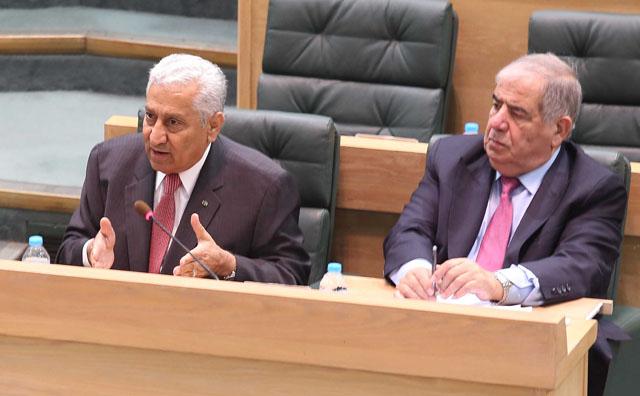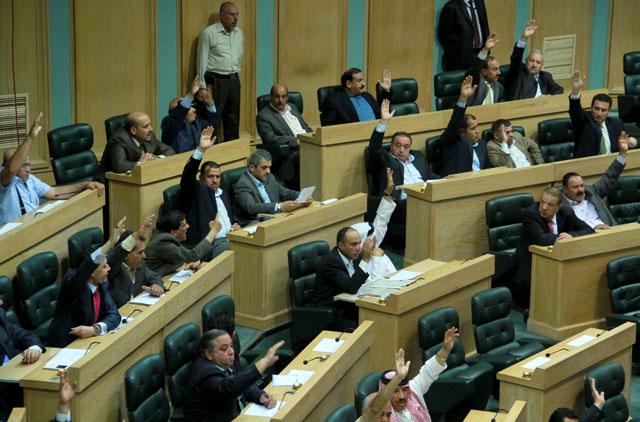You are here
Lower House session on income tax bill adjourned for lack of quorum
By Khaled Neimat - Sep 17,2014 - Last updated at Sep 17,2014

AMMAN — The Lower House could not complete its meeting on Wednesday after it lost quorum amid deliberations over the draft income tax law.
Lower House Deputy Speaker Ahmad Safadi adjourned the session once it was determined that less than 65 MPs out of the 150 members of the House were present.
During the meeting, Prime Minister Abdullah Ensour told deputies that the income tax bill is a crucial law in the government’s economic reform agenda.
The bill is expected to increase tax revenues by curbing tax evasion, and would take “from those who have to give to those who don’t”, according to Ensour.
This is the law that will achieve “social justice”, he noted.
Several MPs called on their colleagues to resend the bill to the House’s Finance Committee for further examination.
“This is a technical piece of legislation, and we need to make sure that the concerned committee has studied it thoroughly before engaging in a general debate over it,” said MP Mahmoud Kharabsheh (Balqa, 1st District).
However, head of the House Finance Committee, Kheirallah Abu Saalik (Amman, 4th District), said “the committee met 120 times to discuss this bill”; hence, there is no need for further meetings and “I would suggest that we start deliberations over it immediately.”
Several other deputies criticised the Finance Committee for calling representatives from the International Monetary Fund for a meeting to consult them on the draft law.
After the session was adjourned for lack of quorum, several parliamentary sources claimed that the decision was part of a “deliberate attempt to avoid any mismanagement of a meeting over such a critical law”.
But other deputies said it was a normal step taken because of the lack of quorum.
The current extraordinary session ends on September 30 before Parliament convenes for a new ordinary session in October.
One of the major bills endorsed by both Houses of Parliament during this session — the draft civil retirement law — was rejected by His Majesty King Abdullah on Monday, who said the bill does not address imbalances in the system nor ensure justice.
In a letter addressed to Prime Minister Abdullah Ensour, His Majesty said the debate triggered by the law, approved during a joint Parliament session last week, suggests that there is suspicion over the constitutionality of the draft law, urging the government to refer it to the Constitutional Court and then carry out a thorough study that works out a “realistic solution” that ensures justice for all, taking into consideration the difficult economic situation and budget constraints.
Under the law, MPs and senators granted themselves lifetime pensions equal to those of ministers, setting a seven-year service in Parliament or civil service as an eligibility condition.
In 2012, the legislature annulled a 2010 temporary law that cancelled pension and other benefits to which lawmakers had been entitled.
King Abdullah declined to ratify the move then and asked the government to study the matter and come up with a new law.
The bill triggered public outcry, with Jordanians expressing resentment over the move and accusing parliamentarians of seeking personal gains.
But politicians on Tuesday ruled out that King Abdullah’s rejection of the draft law would stoke tension between the government and Parliament.
In phone interviews with The Jordan Times, lawmakers and a senior official said MPs and senators realise that the King’s decision aimed to ensure the constitutionality of the controversial bill.
Related Articles
Lower House Deputy Speaker Ahmad Safadi on Wednesday adjourned the session due to lack of quorum, amid MPs’ deliberations over the draft investment law.
The Lower House on Wednesday endorsed the draft public-private partnership law one day after concluding deliberations over it.
The Lower House had every right to take its time in discussing the draft income tax law taking into account the best interests of the country, Speaker Atef Tarawneh said Wednesday.


















